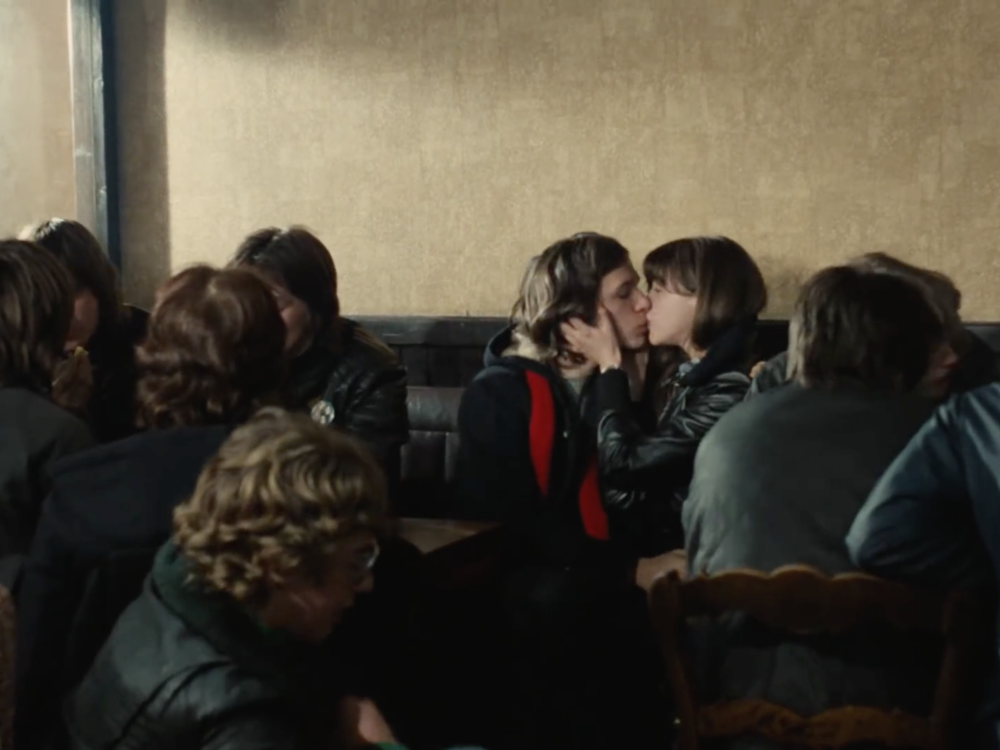
Maurice Pialat: This isn’t cinéma-vérité. That doesn’t exist. Everything is always reconstituted. The only truth of the cinema is what’s filmed with sincerity; there’s authenticity there. The scenario was written with young people in mind, the dialogue was entirely scripted, but there’s a sort of interaction that brings about some alterations; the film ‘leans’ towards the group.
Which pertains to the construction of the film: there are very few close-ups.
Pialat: Close-ups are interesting sometimes, even exciting – in Bergman, for example. But in certain instances they’re useless for ‘underlining the text with red ink’. Lumière filmed togetherness, that is, life. Ozu did it just as much. The sharp montage that belongs to me, the short sequences provide movement, life, and Pierre-William Glenn's brilliant, deep colors provide the warmth of that life.
Maurice Pialat1
Do you have a definition of realism?
Pialat: That’s a pretty tough question. More often than not, realism gets confused with miserablism, or the picturesque, or else something gets called ‘realist’ because it’s shot with direct sound in improvised locations that haven’t been scouted out beforehand – but it’s only a question of budget, it’s not a question of conviction.
However, what can be called my ‘realism’, is the fact that I want to depict people, places, classes I’m familiar with, and depict them as sincerely as possible while taking off from a concrete reality.
Maurice Pialat2
Let’s go back a bit to Passe ton bac d’abord – it involves a group of young people, and yet the choice of each one is extremely precise, one doesn’t have any impression of a group that’s just been slung together: each character is completely singular. I’d like to find out how you chose these young people since a lot of them aren’t professional actors.
Pialat: Rocky, the boy who was the truck driver in Passe ton bac d’abord and whom I used again on Loulou (1980), is someone who completely blows away all preconceptions about professional vs. amateur. That kid, the first second he stepped in front of the camera he became an amazing professional. On the level of unbelievable details that aren’t always visible on the screen but which have a tremendous importance on the set: knowing how to shift his position while being conscious of the possibilities of the framing, of the requirements of the lighting, etc. On Loulou, he practically improvised the ending to a scene by shifting a millimeter closer to us. He’s really an exceptional actor. And then there was something very strong between us.
Maurice Pialat3
Which part of French cinema’s heritage do you feel you have the most in common with?
Pialat: Lumière. Pagnol. Renoir.
Maurice Pialat4
“Passe ton bac is a detail-perfect portrayal of dead-end teenage life in the crap late 1970s, shiny with black pleather and pomme frites grease. [...] Pialat sought always to capture moments of unvarnished authenticity, often working with the barest outline of a script – as on Passe ton bac... Scenes which failed to capture lightning in a bottle were left on the cutting-room floor, regardless of what essential story-advancing information they might have contained, meaning that Pialat’s storytelling is by necessity elliptical in the extreme, often lurching past months and significant life events with a single unceremonious cut.”
Nick Pinkerton5
« Passe ton bac d’abord vire au film choral et à la collection de scènes, parfois étrangement hétérogènes, qui peuvent se succéder sans lien : un bistrot enfumé, une chambre où l’on s’entasse pour parler et rigoler, une virée à mer, un mariage où l’on fait la chenille sur ‘Frou-frou’, une danse dans un restaurant, un dîner entre copains, un bout de cours de philo, le passage de deux agents qui veulent faire ‘des photos’ à une jeune beauté des corons... Cette effusion impalpable et cette impresson d’éléments mis bout à bout ont sûrement placé Pialat lui-même en difficulté : comment tourner tout cela pour lui donner une cohérence minimale, comment faire tenir ces scènes ensemble, comment faire jouer ces acteurs et non-acteurs dans le même plan ? Ce que le cinéaste, sans ménagement comme toujours, résume par une phrase directe dont il a le secret : ‘Comment est-ce que je peux tourner cette merde ?’
Et pourtant ça tient... Passe ton bac d’abord est parcouru par des regards, des visages, des mots, et donne à voir des lieux, des habitudes, des trajets, des sensibilités qui lui confèrent un air de vérité tel que chacun peut voir à l’écran, comme saisi par l’évidence (dérangeante ou euphorique), des personnages quittant leur rôle pour devenir des personnes. Rarement un film aura réussi à donner un tel sentiment d’exister. »
Antoine de Baecque6
- 1Maurice Pialat in conversation with Jacqueline Lajeunesse, Image et Son: La Revue du Cinéma, nr. 342, Septembre 1979, 122. Translated by Craig Keller.
- 2Maurice Pialat in conversation with Mireille Amiel and Dominique Rabourdin, Cinéma, nr. 250, Octobre 1979, 60. Translated by Craig Keller.
- 3Maurice Pialat in conversation with Danièle Dubroux, Serge Le Peron and Louis Skorecki, Cahiers du Cinéma, nr. 304, Octobre 1979. Translated by Craig Keller.
- 4“20 Questions for Filmmakers,” Cahiers du Cinéma, nr. 325, Juin 1981. Translated by Craig Keller.
- 5Nick Pinkerton, “Life Worth Living,” Artforum, 15 October 2015.
- 6Antoine de Baecque, Le Dictionnaire Pialat (Paris: Éditions Léo Scheer, 2008).

